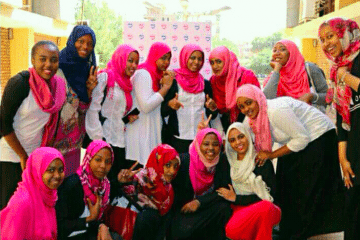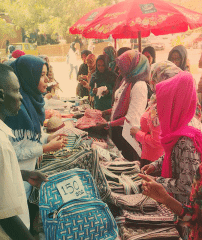Mahabba Association, Ahfad University for Women (Sudan)
Program overview:
Sudan is a country suffering from severe poverty. The financial struggle many Sudanese go through does not allow them to have access to quality health care services and medicine.

Mahabba was founded by two students with the idea of helping people and with the initial goal of providing medicine to people who could not afford them. Safia and Sara, the founders of Mahabba, realized that this was financially unsustainable for a student-run initiative due to the rising cost of pharmaceuticals. They soon began to raise money on Facebook and on campus to help pay for people’s healthcare insurance. After two years of doing this, they met a woman who was soon to be imprisoned because she had a small debt. Safia and Sara were moved by her story and decided to investigate.
 Safia and Sara went to the prison and met many women who were in similar predicaments. They wanted to help the women but did not know how. They went on social media (Facebook) and began to raise awareness of the issue by telling the stories of these women and the online community responded positively and mobilized by raising funds to help to pay off some of the debts to ultimately release them from the prison. Through this experience, Safia and Sara realized that the root of the problem for these women (and many other Sudanese women) was that they did not have a way to become economically empowered.
Safia and Sara went to the prison and met many women who were in similar predicaments. They wanted to help the women but did not know how. They went on social media (Facebook) and began to raise awareness of the issue by telling the stories of these women and the online community responded positively and mobilized by raising funds to help to pay off some of the debts to ultimately release them from the prison. Through this experience, Safia and Sara realized that the root of the problem for these women (and many other Sudanese women) was that they did not have a way to become economically empowered.
To empower the women, Safia and Sara began to encourage the women inside the prison to teach each other whatever handicrafts they knew in hopes that this would be a way for the women to make a living. The women learned to create beautiful bags and satchels that Safia and Sara later sold at the weekly bazaars on campus and online. The women slowly began to pay their debts and also gave to a portion of the profits back to Mahabba’s initial goal of paying for people’s health insurance.
“It is a human mobilization inside the jail. It gives them hope and lets the community know that even though they were once prisoners, they are not stigmatized. It creates peace and empowerment” – Safia